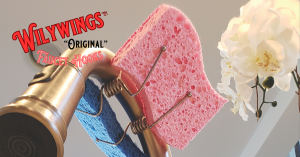Faucet Hooks: New Kitchen & Bath Category Creates Usable Space Above the Sink
The Malibu, CA-based venture may benefit from tariffs on Chinese goods.
The innovative hooks attach to almost any kitchen, bathroom, shower or utility faucet to create useful space for drying sponges, brushes, loofahs, baby pacifiers, and more. Sawyer takes credit for establishing a new proprietary home goods subcategory above sinks, and he hopes Wilywings will soon become ubiquitous. “Every home with running water can benefit from the convenience of drying small items above sinks. Faucet hooks will eventually become like paper clips. Every home will have a few.”
According to Sawyer, the inventor-entrepreneur behind Wilywings, “Space around the sink, especially in the kitchen, is high value real estate and I wanted to find a way to use it more effectively. It turns out the faucet itself is a handy place to add capacity for drying sponges and other light items.”
Launched on Amazon in May 2025 as a 2-pack under the Wilywings brand, the hooks are made from 316 medical grade stainless steel wire in a W-shaped springform where the ends of the “W” each serve as a “hook”. The wire coils provide at least two methods for attaching the hook to a faucet: an elastic band can be stretched around opposite coils, or a zip tie can go through the coils. Wilywings hooks are nearly universal as they attach to almost any size, shape or style of faucet. Several clear elastic polybands are included in each Wilywings 2-pack.
Initially motivated to find a solution for drying kitchen sponges before they start to stink, Sawyer rejected traditional designs that occupy counter space or attach inside the sink either by suction or adhesive. “I’ve never liked these [suction and adhesive] sponge holders because they take up valuable space, and airflow in the sink is not optimal for quickly drying a sponge.”
Sawyer ended up with a design that works not only for kitchen sponges, but also for drying a range of items in bathrooms, showers and utility sinks. “My dad started using a prototype on a bathroom sink faucet for his toothbrush, and an artist friend uses several Wilywings hooks on a utility faucet for drying paint brushes and other craft tools.”
As for showers, Wilywings hooks attach to the neck of the shower head and create a perfect place for hanging a razor, a loofah, scrub mitts or any other item that may otherwise be getting moldy sitting on a wet shelf.
The deceptively simple design of the Wilywings hooks lends itself to mass production and makes them an economical option for price conscious consumers (retail price on Amazon is $8.99 for a 2-pack), especially for roommates in small apartments or dorms with shared bathrooms and limited counter and shelf space.
While Wilywings hooks are economical, they are proving to be a popular minimalist chic solution among Sawyer’s neighbors in the exclusive beach community of Malibu. According to accomplished singer-songwriter Marty Cooper, standing at the kitchen sink of his beachfront house, “Wilywings hooks have decluttered my kitchen and bathrooms and keep my sponge smelling good. I love their simplicity and lack of pretentiousness.”
Sawyer has been prototyping various ornamentations and hopes to launch limited edition hooks in the future. Available for now exclusively through Amazon, Sawyer plans to explore additional distribution and sales channels. “It will take some time for the idea of hanging stuff from faucets to take hold - and then Wilywings will start getting space in mass consumer locations next to kitchen sponges and loofahs. Eventually everyone will have at least one or two Wilywings around the house.”
About Wilywings™
Wilywings™ Faucet Hooks and the Wilywings brand are wholly owned by serial inventor-entrepreneur Wylie Sawyer. Sawyer was formerly co-founder of the highly successful BODYCOFFEE brand of personal care products that sold in 5-star spas including Four Seasons and mass consumer outlets such as Target, and was founder-inventor of Local Water Filling Stations, an advertising-supported network of proprietary water bottle filling stations in colleges and health clubs.
Wylie Sawyer
Wilywings
wylie|wilywings.com| |wylie|wilywings.com
Visit us on social media:
Instagram
Legal Disclaimer:
EIN Presswire provides this news content "as is" without warranty of any kind. We do not accept any responsibility or liability for the accuracy, content, images, videos, licenses, completeness, legality, or reliability of the information contained in this article. If you have any complaints or copyright issues related to this article, kindly contact the author above.
Decorative Concrete Market Size, Trend, Growth, Competitive Insights, Leading Players by 2025-2032
Benzenoid Market Trends, Strategy, Application, Analysis, Global Share and Forecast-2031
Tom Jackobs Urges Entrepreneurs to Burn Their Old Sales Scripts This Fourth of July
Kalendarium
Więcej ważnych informacji
 Jedynka Newserii
Jedynka Newserii

 Jedynka Newserii
Jedynka Newserii

Prawo

KE proponuje nowy Fundusz Konkurencyjności. Ma pobudzić inwestycje w strategiczne dla Europy technologie
W środę 16 lipca Komisja Europejska przedstawiła projekt budżetu na lata 2028–2034. Jedna z propozycji zakłada utworzenie Europejskiego Funduszu Konkurencyjności o wartości ponad 400 mld euro, który ma pobudzić inwestycje w technologie strategiczne dla jednolitego rynku. Wśród wspieranych obszarów znalazła się obronność i przestrzeń kosmiczna. Na ten cel ma trafić ponad 130 mld euro, pięciokrotnie więcej niż do tej pory.
Firma
Były prezes PGE: OZE potrzebuje wsparcia magazynów energii. To temat traktowany po macoszemu

Choć udział odnawialnych źródeł energii w miksie energetycznym Polski jest stosunkowo wysoki i rośnie, to ten przyrost jest chaotyczny i nierównomiernie rozłożony miedzy technologiami – wskazuje Forum Energii. Dodatkowo OZE potrzebują wsparcia magazynów energii, a zdaniem Wojciecha Dąbrowskiego, prezesa Fundacji SET, ten temat jest traktowany po macoszemu. Brak magazynów powoduje, że produkcja energii z OZE jest tymczasowo wyłączana, co oznacza marnowanie potencjału tych źródeł.
Infrastruktura
Wzrost wynagrodzeń ekip budowlanych najmocniej wpływa na koszty budowy domu. Zainteresowanie inwestorów mimo to nieznacznie wzrasta

Budowa metra kwadratowego domu w Polsce kosztuje od 5,55 do 6 tys. zł w zależności od województwa – wynika z najnowszych analiz firmy Sekocenbud. Najdrożej jest w Warszawie, gdzie cena za metr kwadratowy domu przekroczyła już 6,2 tys. zł. Na przyrosty kosztów budowy domu wpływają zarówno drożejące materiały budowlane, jak i wyższe wynagrodzenia pracowników. Inwestorzy nie rezygnują jednak z budowy domów jednorodzinnych, co ma związek m.in. z wciąż wysokimi cenami mieszkań czy też obniżką stóp procentowych.
Partner serwisu
Szkolenia

Akademia Newserii
Akademia Newserii to projekt, w ramach którego najlepsi polscy dziennikarze biznesowi, giełdowi oraz lifestylowi, a także szkoleniowcy z wieloletnim doświadczeniem dzielą się swoją wiedzą nt. pracy z mediami.









.gif)

 |
| |
| |
|